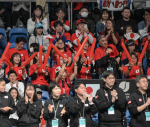You are here
Tunisia — top of the class?
Nov 25,2014 - Last updated at Nov 25,2014
Last week I visited Tunisia for a conference.
The preparations for last weekend’s presidential election were in full swing. As the taxi driver who drove me from the airport said, “we are proud to be Tunisians: top of the Arab Spring Class of 2011”.
Sunday’s vote was indeed the first freely contested presidential election in Tunisia’s history.
As with the parliamentary elections held last month, the presidential election was peaceful and all the parties and candidates were allowed to have their say.
Tunisia has had a major role to play in the series of upheavals that confronted the Arab world in the last four years.
The Ben Ali regime’s brutal crackdown on popular demonstrations after Mohammed Bouazizi set fire to himself led to the dictator fleeing the country.
Such a demonstration of people power was unprecedented in the Arab world and sparked similar revolutions in Egypt, Syria and Libya.
But unlike other countries, Tunisia managed to pass a new constitution and hold elections in the spirit of true multi-party democracy.
So how has Tunisia got it right? And are there lessons to be learned for other countries in the region?
It has not been easy.
At one stage, the stability of the country was in doubt.
Only a year ago, the coalition government led by Ennahda Islamist party was seriously challenged by the economic and security problems facing the country.
Some secularists saw what was happening in Egypt and wondered whether a Tunisian Tamarrod movement could achieve the same.
It did not happen. Instead, civil society mobilised: trade unions, the employers association, the human rights league and the lawyers association all pushed for reform.
A national dialogue was set up, in which all the key political parties were encouraged to participate.
Over four months, there was a great deal of talking. That dialogue built trust, and trust built compromise, which in turn built consensus.
An important factor was the new constitution that passed earlier this year.
This document was the subject of lengthy and heated debate. Again, it took time to find the compromises that allowed it to be, in the words of the constituent assembly speaker, a document in which all Tunisians could find themselves.
The constitution is very progressive and inclusive, encouraging liberty and freedom of expression, respecting all religious sects and political groups, and giving explicit recognition to the rights of women.
Why did Tunisia go for compromise rather than conflict?
A key reason is that Tunisia has a strong sense of national identity that puts the collective national interest first.
This meant that all parts of society, secular and Islamic groups, businessmen and trade unions, participated with the aim of doing the best for the nation rather than for their narrow interests.
The practice of debate has fed through into elections last month for a new parliament and the first round of presidential election last weekend.
The 27 presidential candidates were discussing what they would do to tackle Tunisia’s problems.
Like in all countries, the economy is high on the agenda: how to generate growth, generate jobs and reform education.
Security is also a major issue. Tunisia has a large number of fighters in Syria and Iraq, and there are, inevitably, concerns about extremism and radicalisation.
These issues are important to voters, and politicians have to have answers to their questions.
Of course, every Arab country is different and what works in one might not be a solution in another.
But the key themes from Tunisia are valid for other countries: governance and the rule of law, dialogue and policy debate, compromise and consensus, respect for others’ views and consent through inclusivity.
My taxi driver was right to be proud of his country. Tunisia has set an important benchmark for other countries in the region.
The writer is British ambassador to Jordan. He contributed this article to The Jordan Times.












